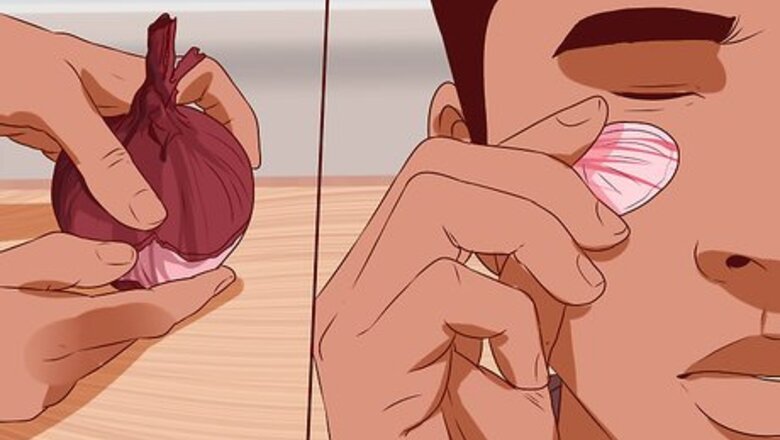
views
Harmlessly Irritating Your Eyes
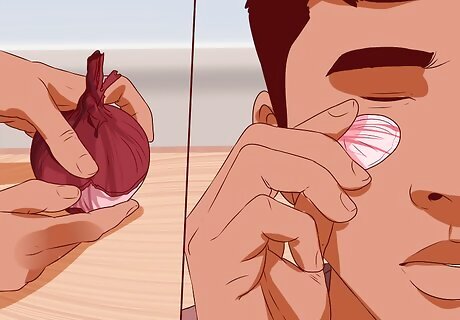
Peel an onion and rub a small piece below your eye. What cheap, widely-available item can make someone's eyes teary and red in a matter of minutes? It's not a Hallmark card — it's an ordinary onion! Onions produce syn-propanethial-S-oxide, a chemical irritant that causes the eyes to produce tears and turn red.Peeling or chopping an onion normally will usually cause your eyes to water, but you may need prolonged exposure to make your eyes water enough to turn red. Try keeping the center portion or a section of the peel and running it beneath your eyes a few times when your eyes need to appear red. Try to avoid using so-called "sweet" onions (like, for instance, Vidalia onions), as these generally don't produce as much irritation and tearing. For best results, use a strong-flavored white or yellow onion. For a gentler approach, place a few pieces of the onion into a tissue or handkerchief and rub the handkerchief beneath your eyes. The barrier will protect your eye itself from coming into direct contact with the onions, but the irritant should still have an effect as long as the material in the tissue is not too thick. If you're trying to fake the appearance of crying, for an added effect, try rubbing a little inside the bottom of your nostrils to encourage a runny nose.
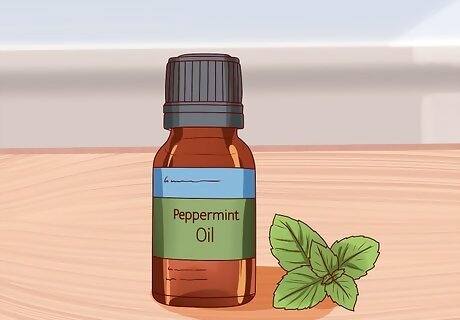
Alternatively, try peppermint oil. One method that's virtually identical to the menthol method above involves products that contain peppermint oil. Simply use the exact same steps — rubbing a small dab below each eye — to produce a very similar effect as the fumes from the oil irritate the eyes. As above, avoid getting the oil into your eyes, as this can cause stinging and prolonged discomfort. Peppermint oil can be found at most high-end grocers, specialty food retailers, and health food stores. However, if you don't already have any, it may be more cost-effective to use menthol or an onion, as peppermint oil is usually more expensive by volume.

Resist the urge to blink. If you need red eyes right away, don't worry — you can get them without any sort of special materials at all. Simply hold your eyes open for as long as you can, fighting the urge to blink until it's too painful not to do so. Since frequent blinking is the body's way of keeping the eyeballs well-lubricated, without this, the eyeballs will begin to dry out. When this happens, the eyes should become irritated, puffy, red, and often watery. Note that this can feel quite unpleasant! For added effect, try looking at a light while you hold your eyes open. Do not use a very bright light or the sun, however, as this can cause lasting eye damage and even blindness.
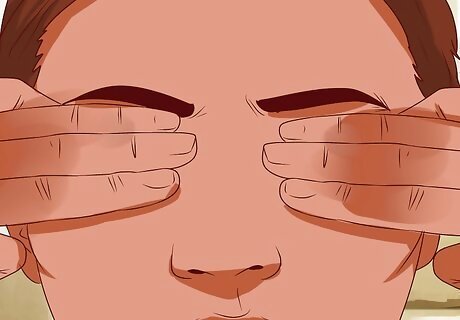
Gently rub the area below your eyes. One method for inducing red eyes that's frequently used on TV and in movies is balling the hands into fists and rubbing the area around the eyes. This mild form of physical irritation can cause the same sorts of symptoms that onions and other chemical irritants do — namely, red, watery eyes. If you're attempting this method, be sure to use gentle pressure. Crucial parts of the eye like the iris and cornea can be quite delicate, so don't damage your vision simply to make your eyes red. In addition, be sure to keep your eyes closed and to avoid touching the eye directly. Doing this can transfer bacteria from your hands (which can pick up millions of bacteria from ordinary daily activities) to your eyeball, potentially leading to a painful infection]].

Spend time at the pool. Chlorine is a great pool-sanitizer, but it's also thought to be an eye irritant, though some sources suggest other chemical culprits. What is clear is that going for a dip in a chlorinate pool without goggles can leave your eyes puffy and inflamed (though the damage is not ordinarily serious or long-lasting.) The effect is increased if you hold your eyes open underwater for an extended length of time. Make sure you do not wear goggles, since the goggles will shield your eyes and prevent the pool from having an effect. Salt water pools also work well for this purpose. However, some eye health resources claim that saltwater is less irritating than chlorine, so the effect may be lessened.

Get less sleep. Though this isn't an ideal solution for many (especially people who need to be fully "sharp" and focused for any reason the following day), skipping sleep will usually turn your eyes red and bloodshot in the morning. As long as you do not make a habit of it, missing one full night’s sleep will usually not have a dramatic impact on your health. However, missing out on sleep repeatedly is something you'll never want to do, as this can have major consequences for your health, including: reduced cognitive ability, decreased sex drive, depression, and increased risk for serious ailments like stroke and heart disease. Remember never to drive when you're severely tired or groggy. Because sleep deprivation dulls your reflexes and impairs your split-second decision-making ability, it can make you a major danger on the road. One Australian study found that people who have been awake for 24 hours have a level of impairment equal to someone with a blood alcohol concentration of .10 (the legal limit in most countries is generally about .08).
Using Psychological Strategies

Put yourself in a sad or depressed mindset. Learning how to make your eyes red and teary on command for the purpose of "fake crying" can be seriously challenging — even professional actors often struggle with it. Though there's no "right" way to do this, certain psychological tricks can be a major help. One useful strategy is to focus on memories and ideas that make you sad, like a close relative who has passed away, a humiliating event you experienced, or a major worry or fear in your life. As unpleasant as it may feel to experience them, the more dark and depressing your thoughts, the more they can help you get into a crying mindset. Just a few more examples of things you might want to think about are: romantic breakups, recent arguments, troubles at work, times when friends or family betrayed you, people that have drifted out of your life, and times when you've been very fearful for yourself or someone close to you. It can be especially helpful to try to convince yourself that all the people you know "have their lives together" except for you. Try to evoke feelings of hopefulness and despair — think to yourself, "This is it — I'll never be successful and happy." However, be sure not to let yourself wallow in this mindset after you need to fake being sad. The last thing you want to do is to make yourself genuinely depressed.

Focus on personal pain. In the words of one New York University acting teacher, an actor trying to fake cry should “particularize the moment or text with something specific and personal to the performer, so that it becomes less about what is demanded of them and more about an inner secret, desire, fear.” In other words, the best way to get yourself sad enough to cry is to lose yourself in thoughts about your deepest, darkest inner fears and demons. Try to mentally convince yourself that the task you need to fake cry for is all about you being judged as a person even if it's not. Be prepared to dig up and confront your worst personal demons. One critically acclaimed actor, Bryan Cranston of Breaking Bad fame, has revealed in interviews how his most intense inner fears have helped him give a convincing performance of someone in a tortured mindset. Speaking of a scene in which his character witnesses the death of a younger female actor's character, Cranston said: "My real daughter's face took her place, so it just hits me ... She's just a girl — she could be my daughter."

Make yourself angry or frustrated. Red, teary eyes aren't always the result of sadness. Sometimes, these symptoms are brought about by intense feelings of rage or frustration, especially when they're caused by someone close to you. If you're having a hard time crying from purely sad thoughts, try mixing in a healthy dose of anger to get results. For instance, you may want to try to think about a current difficulty in your life that's very frustrating to you, like a relative with self-destructive behavior who won't listen to your advice. Just a few more examples of things you may want to think about are: times when you've been "passed over" for an award or promotion, times when your enemies have succeeded over you, times when you've been treated unfairly by someone with power over you, and times when you've witnessed or experienced social injustices.
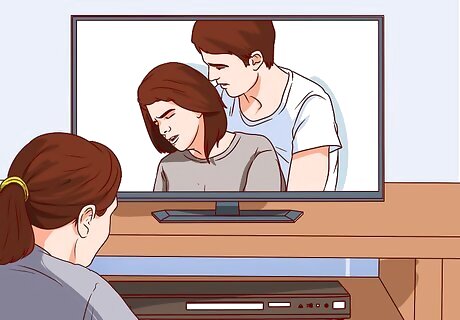
Use moving media to help you. The motivation to tear up doesn't have to come 100% from within — sometimes, using outside sources can be a huge help. This is a strategy that's often used by actors both to get in the proper mindset for an emotional scene and to help assume the appearance of someone who's experiencing these intense emotions. Movies, books, songs, and other forms of art that inspire deep sadness or frustration can be very effective here — below are just a few ideas to get you started, but there are many, many more. Movies: The Notebook, The Green Mile, The Fault In Our Stars, Titanic, Dumbo, Up, Come and See (Russian film) Books: 'The Kite Runner, The Giver, Wuthering Heights, The Idiot, any of the later Harry Potter installments, any books that the movies above are based on. Songs: Yesterday (Beatles), The Needle and the Damage Done (Neil Young), Brenda's Got a Baby (Tupac Shakur), Bad Religion (Frank Ocean), virtually any Elliott Smith song.
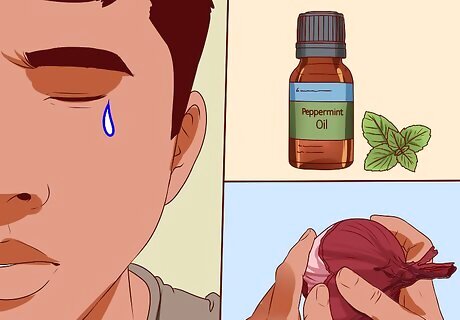
Keep your expectations in check. It's important to remember that the strategies in this section may be even harder to get to work than the other tricks in this article, even if you're someone who easily cries when sad. It can be very difficult to make yourself feel sad enough to cry, just like it's difficult to tickle yourself. Even A-list actors often have a hard time "willing" themselves to cry, so be ready and willing to use another method if these psychological strategies don't work for you.
"Faking" Red Eyes
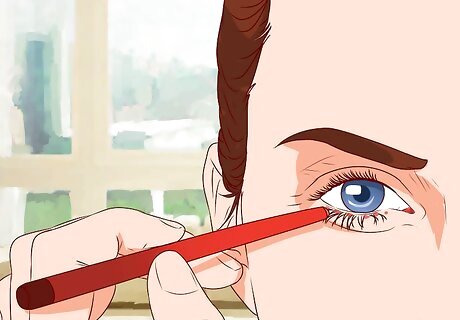
Consider using makeup. If you can't make it, fake it! With the right tricks, it's possible to use aesthetic tricks to make your eyes appear red and puffy as if you've just been crying, even if you feel perfectly fine. Because these tricks don't actually irritate your eyes, they're vastly more comfortable than some of the methods listed above. For example, try this makeup strategy to give yourself red eyes: Apply small dots of red eyeliner around the outline of your eye. You can also use a red eye shadow or red lip liner, but make sure that any lip liner you use is mild enough to use near your eyes before applying it. Place the dots along the entire bottom lid. For an even stronger red effect, you can also apply the dots along the upper lid. Smudge the liner over your skin using a cotton swab or makeup smudge stick. In order to make your eyes look red, you will need to cast a somewhat muted red "shadow" around their lids. None of the original lines or dots should be visible, so continue smudging until you can no longer see the original dots. This will take 2-3 minutes.
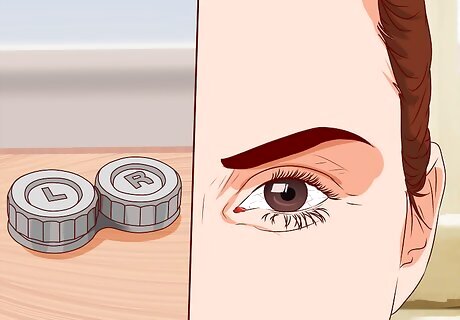
Consider using colored contacts. Another easy way to give your eyes a "reddened" effect is to wear specially-made contacts with a reddish tinge or with veins drawn on them. With these, however, it's important to choose a contact that makes the whites of your eye red, not the iris (the portion that's normally blue, green, or brown.) If you give yourself red irises, you'll look like a vampire or a demon, not someone who's just cried. Some theatrical supply companies make custom-crafted contact lenses for movies and stage productions, so you may want to shop here if you're looking for a high-quality product. However, these aren't likely to come cheap — professional-quality lenses can easily cost over $100.
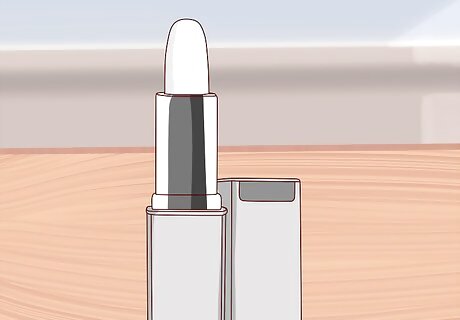
Enhance the effect with a "tear stick." If you're faking your red eyes for a stage or film production, it can be a good idea to accompany the tricks above with some actual tears to make the effect look more realistic. In this case, you may want to consider buying a "tear stick," which is a tool used by some actors that basically amounts to a stick of semisolid gel or wax containing menthol. The tear stick usually comes in a tube resembling lipstick and is applied by rubbing it beneath the eyes, where the vapors from the menthol stimulate the eyes to produce tears. Note that since the "active ingredient" in a tear stick is menthol, this method works exactly like the menthol suggestion in the section above.
Knowing What to Avoid
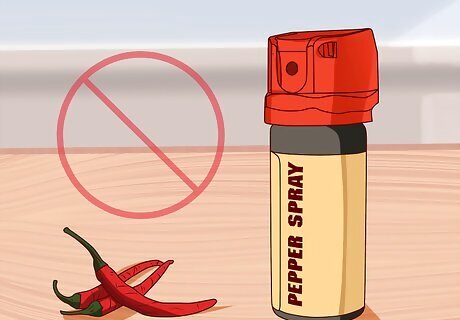
Don't use strong irritants like pepper, mace, etc. It's never a good idea to seriously risk the health of your eyes in the name of getting convincing redness. Never put anything in your eyes that's likely to cause serious irritation, including intense chemical irritants like "mace" (pepper spray) and natural substances like hot pepper products. In sufficient quantities, these substances can cause permanent damage and even blindness.
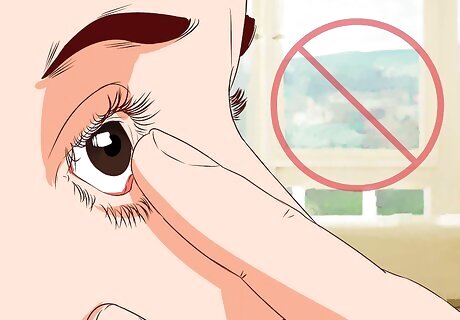
Don't irritate the eyeball directly. If you're using a method that involves rubbing the skin around the eyes to induce redness, be sure not to touch the naked eyeball itself. Even if you manage to avoid injuring it, this runs the risk of transferring bacteria from your hands to the eyeball, which can lead to infections (as noted in the section above.) This risk is amplified if you've just touched something with lots of bacteria on it (like a doorknob.) In addition, since your eyeballs are so delicate, touching them directly can sometimes cause physical injuries. Even the smallest scratches can be quite uncomfortable when they're on your eye, while more serious injuries (like an irritated cornea) can require medical attention.
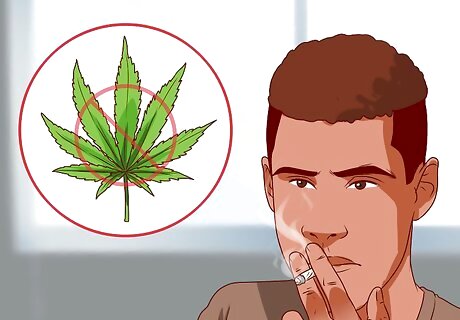
Don't consume marijuana specifically for red eyes. We've all heard it before — marijuana use causes comically red eyes. While this is true, it's not a good idea to smoke (or eat) marijuana products as a way of getting your eyes red. If you're creating the red eye effect for acting purposes, the cognitive impairment that can result from a marijuana high can make it difficult to give an appropriate, convincing performance. Additionally, marijuana intoxication is often punishable by law, with punishments ranging from minor to severe depending on the local jurisdiction.




















Comments
0 comment